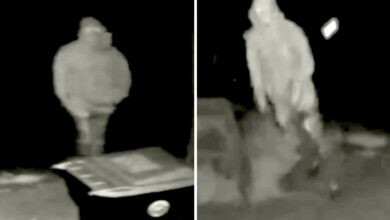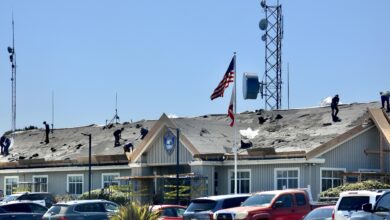Dioxin dirt removal from McGuire Ranch set for September
Tom Lanphar, the new Department of Toxic Substances Control (DTSC) program manager for both the Georgia Pacific Mill Site and the McGuire Ranch, sought to put the amount of dioxin contamination found at the ranch with an analogy based on the federal stimulus plan.
“If the bailout is $1 trillion, this [highest reading] of 91.7 parts per trillion would be $91 dollars and 70 cents. With that amount of money you could go out and buy dinner,” Lanphar said.
Anna Marie Stenberg of Fort Bragg wasn”t ready for that meal. “If we had $91 worth of dioxin, we”d be dead,” she said.
The occasion was unveiling of the new McGuire Ranch Draft Removal Action Workplan at a Tuesday night meeting at Dana Gray Elementary School.
Such back and forth went on for more than three hours between a crowd of about 25 people and three state experts, as the complex science and politics were unraveled, revealing quite a bit of new information.
Lanphar explained that all dirt on the Airport Road ranch with dioxin contamination levels above 40 parts per trillion is to be removed this September and October. About 3,900 cubic yards of soil would fill 250 trucks, each driven to Bay Area landfills in Pittsburg and Vacaville.
The cost of the cleanup is estimated at $850,000, with about $400,000 of that being the transportation.
The contamination came from the former Georgia Pacific mill”s power plant, where wood waste was burned from 1992 to 2002.
Georgia Pacific is footing the entire bill, including the salaries of state officials on hand for the meeting. Lanphar says that means he even gets paid on furlough days.
Most of the G-P waste provided to the Bald Mountain ranch as a soil amendment was simply from milled trees. But during the last two years, municipal wood waste was taken, which had plastics and elevated dioxin levels. That led to a finding that soil needed to be removed from a 2.5-acre area of the 256-acre property.
State toxicologist Kimi Klein surprised some in the crowd with news that the 40 parts per trillion figure wasn”t written into any law.
Klein said the United States has no standard for dioxin contamination in agricultural soil. McGuire Ranch is the first time the state has dealt with the issue of acceptable dioxin contamination levels for agriculture land. She researched dioxin standards of other nations to come up with the 40 ppt figure. The goal is to reduce that number to about 10 ppt, Klein said.
The 40 ppt standard is used by Germany, with two European countries lower and several higher.
“In the United States, the action level is 1000 parts per trillion,” Klein said.
Klein explained how modern society, where few people handle, much less occasionally ingest dioxin-laced soil, is actually less at risk than people in agriculturally based nations — or cattle.
Thais Mazur asked Klein whether any meat from cattle that had grazed on the ranch had ever been tested for dioxin.
Klein said no.
“They don”t slaughter their own meat there,” she said.
Klein explained that pregnant cattle arrive at the ranch, calves are raised and then sold at auction, where they go mostly to slaughterhouses.
Dioxin is the most toxic substance ever made by man but scientists believe it is introduced into the body through ingestion, not exposure, Klein explained.
Klein explained that every person has a dioxin level, with older people having more as the substance concentrates and does not leave the body.
Stenberg said she has 27 times more dioxin in her body than the average person and listed a litany of health problems that has caused. She wanted cattle now on the site kept off the contaminated area and tested.
Klein said testing was difficult because the cattle there are basically wild.
Many in the crowd asked the state to authorize use of mushrooms to break down the dioxins on site.
“I don”t understand moving it, using diesel fuel and going to dump this on somebody else. Why not try the mushrooms?” said Stenberg.
Lanphar said the alternatives that were on the table include capping, taking no action or the removal now planned.
“It did not include mycoremediation. That”s promising technology. I hope we get there. We are not there yet,” said Lanphar.
Locals continued to press the issue of fungal mycoremediation throughout the meeting. Chip Hillarides of G-P ultimately said the company will move ahead with a bench test of mycoremediation involving the city of Fort Bragg, community members and DTSC.
Comments were accepted at the meeting and will be accepted through Aug. 7, by email to tlanphar@dtsc or by regular mail to DTSC, 700 Heinz Ave., Suite 100, Berkeley, CA 94710.
Lanphar said the state continues to investigate reports of sites that may be dioxin-contaminated. He said a phone line will be set up for people to confidentially report if they have fly ash from G-P on their land or know of any on public property.




